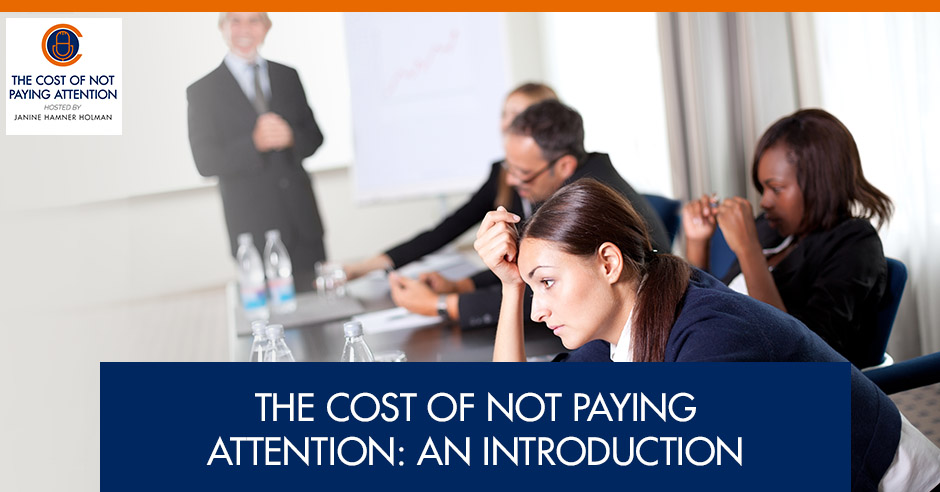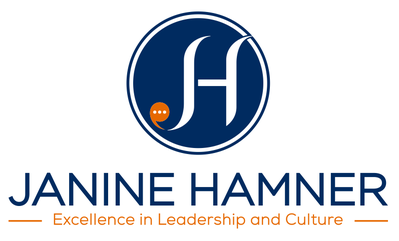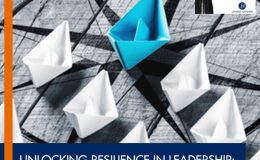
Brain science has revealed that up to 90% of what we do and say happens through unconscious thought and unconscious action. Welcome to The Cost of Not Paying Attention! Hosted by Janine Hamner Holman, the show explores all the things inside organizations and cultures that we’re not paying attention to – the unsaid expectations about how we think things should be that we don’t ever talk about. In this initial episode, Janine shares upcoming show topics such as managing people and teams in times of disruption, unconscious biases, and many more. It’s time to get involved. We invite you to expand your focus and pull from your subconscious and into your consciousness so you can make better decisions, be more productive, and build the kinds of lives, organizations, and society where we all get to thrive.
HOST: Janine Hamner Holman | [email protected] | LinkedIn, Facebook, and Twitter | Subscribe to my Newsletter! Book me to Speak!
—
Listen to the podcast here:
The Cost Of Not Paying Attention: An Introduction
This is the very first episode of my show. You may be wondering, “Why The Cost of Not Paying Attention? What are we not paying attention to?” Here’s the super interesting thing. When I started thinking about doing a show, I got to thinking about, “What do I love working most with clients on?” I am an organizational development management, executive coach, leadership person. I work inside of organizations to help make things that aren’t working great a lot better. I got to thinking about, “Why are all these different things going wrong? What’s happening?” A lot of it is that we’re not paying attention to some stuff. It’s not that we’re being bad. We don’t know that we’re supposed to be paying attention to these things.
One of my favorite expressions is about what I don’t know that I don’t know. That’s what this show is all about. A lot of what I’m going to get to talk about is in the domain of work. It’s not all about work because we, as humans, we are who we are at home and at work. We are all the same person. Science is going to come into this, which I find crazy. When I was in school, the last thing that I wanted to talk about was science. I was not awesome at it. When I got to college, I took Chem for kids. I was an English and Political Science double major, so there’s a little bit of science, but that’s not science-y science. As a grownup, I have gotten super interested in brain science like, “What’s going on in our brain that’s contributing to how we live our lives?”
I am going to talk about science, particularly brain science. One of the things that I find fascinating is that brain science has revealed that up to 90% of what we do and say happens through unconscious thought and unconscious action. That’s amazing? I was talking with a client and we were talking about all the things inside of his organization that are happening in the unsaid. Isn’t that how it often is? We think we’re up to something with somebody else, but there are a lot of expectations about how we think it should be and how we think it should be going that we don’t ever talk about. It’s in the unsaid. It’s something that we’re not paying attention to in a conscious way. In this show, what we’re going to do is lean into where by paying attention to some of these key places, we can reap huge rewards.
In the first several episodes, a lot of what we’re going to get to talk about is excellence in leadership and culture and like, “What the hell is culture?” There are many different ideas about what organizational culture is. The good news is that every organization gets to define for themselves what their culture is. There are some key hallmarks of culture that transcend any individual organization. We’re going to talk about the power of emotional intelligence. I don’t know how many of you all have ever heard about emotional intelligence. It was something that social science researchers started looking into in the late 1980s because they were realizing that there are some people who have a super-high IQ but then aren’t killing it at life. There are these other people who are not so hot with IQ, but they are killing it at life. Maybe there’s another kind of intelligence at work. There is and it’s called emotional intelligence.
Brain science has revealed that up to 90% of what we do and say happens through unconscious thought and unconscious action. Share on XYou don’t need me to tell you, we are living through times of enormous disruption. Many industries and businesses have been in a place of disruption for a long time. There are some critical conversations that are happening. In one of the episodes, I talk about managing people and teams in times of disruption, and that includes ourselves. Our selves are one of the most challenging things to manage well in a time of disruption. I’m going to talk about listening and how most of us stink at listening. We’re going to get into that. What’s the difference between listening and hearing? Hearing is a biological function that happens inside of our ear and then inside of our brain. Listening is a learned skill and that’s what most of us stink at. We’re going to look at that and how do we get better? What’s the payoff if we do, when we do?
The last thing that I want to tell you about in this first episode is our theme song. I love our theme song. It was written especially for me by two amazing artists. It was written by Keith Serpa and then he sings along with Julie Dean, who is not only his collaborator but also his beloved. I love the song and I love them. Thank you so much for contributing to the show. I’m excited about what we’re going to get to contribute to each other, to the world and get into the business of making work something that we all want to do, excited to do and how to tap into what lives within all of us.
I was talking with somebody about high trust and high love leadership. When I got started working many years ago, there was nothing about love in the world of work. Now, it’s something that people think about. Not only people who are built with more estrogen than the other half of the human race. The person I was talking to is a man. He works with organizations to help them bring more love into their organization. I’m going to be interviewing him in an upcoming episode. That’s one of the things that I’m going to get into. After the first few episodes, I’m going to start doing a lot more interviews with people and helping to highlight what they’re up to in their organizations. I love those episodes. I’m excited to get to do this with you, with the people that I get to interview, with the organizations that I get to work with day in and day out. I’m glad that you’re joining me.
As we go along, we’re probably going to talk about things like unconscious bias. There’s a great, amazing, important, difficult conversation that’s happening about our unconscious biases. I bet we’re going to get into that. I also happen to be a white woman who happens to be married to a black man. That’s going to come into the conversation. When I first started work, I was a community organizer in a neighborhood in Brooklyn that was then referred to as Bed–Stuy, which is more referred to now as Bedford Stuyvesant. This was in the late 1980s and the whole community was black. I was coached by a guy I ran into in the street who said, “What are you doing here, honey?” I was walking around with my clipboard and he said, “So you don’t get fucked with, you need to go to Woolworth.” That puts this all in a place and time. “You need to get a cheap ring and then go get some gold fingernail polish. Make it look gold and wear it on your left hand, so that people don’t mess with you.”

Manage Our Brains: In our current state, we’re not physically able to maintain that state of energetic and enthusiastic creativity for very long. So when the ferry of ingenuity and innovation lands on your shoulder, do everything that you can to take advantage of it while it’s there.
How far we’ve come and how far have we not come? It’s one of the things that we have not been paying attention to in the way that we’re going to get to. We’re going to be part of that conversation. It’s not going to be one of our first episodes, but we’re going to get there. My purpose in this show is to expand our focus, pull from our subconscious and into our consciousness so that we can make better decisions, be more productive and build the kinds of lives, organizations and society where we all get to thrive. I’m thrilled to be on this journey with you. Thanks for reading. Until next time. Remember, great leaders make great teams.





